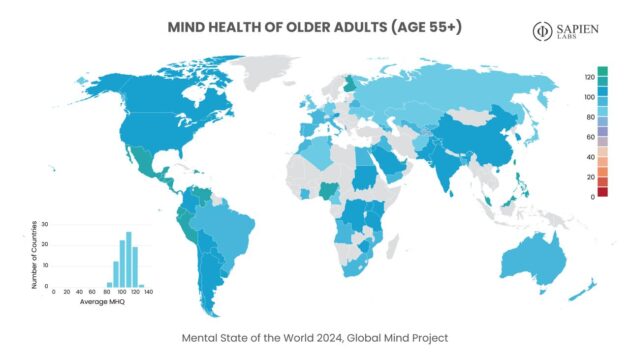
New Report » Capital News
NAIROBI, Kenya, Mar 8 – Young Kenyans adults exhibit between 50-60 on a Mental Health quotient (MHQ) scale of 0-100, a new Mental State of the World 2024 Report has revealed.
The study suggests that this is a higher score compared to their peers in high-income nations.
The findings come from the report by Sapien Labs, a global leader in mental health research, which analyzed over one million responses from internet-enabled populations in 76 countries.
Kenya’s MHQ score places it among the higher-ranking African countries for youth mental health, alongside Nigeria, which scored above 60.
However, the report notes that while Kenya and other African nations are performing relatively well, their youth still face mental health challenges compared to older generations, whose scores typically surpass 100 globally.
Meanwhile, Tanzania emerged as the global leader in mental health resilience among young adults.
In contrast, South Africa stands out with a troubling MHQ score of 30-40, aligning more closely with high-income nations such as the UK, New Zealand, and Ukraine.
These low scores reflect significant mental distress among the country’s younger adults.
The report, however, highlights a disturbing global trend revealing that mental health among young adults aged 18-34 in Western nations has drastically declined since 2019, with no sign of recovery.
The Mental State of the World 2024 Report does not focus on indicators of happiness or monitor anxiety and depression levels.
Instead, it assesses all aspects of mental health, including emotional, social, and cognitive functions.
The findings reveal that nearly half of young adults globally are grappling with functionally debilitating struggles.
These challenges are linked to a range of factors, such as weakened social connections, increased smartphone use, poor diets, and environmental toxins.
Tara Thiagarajan, Founder and Chief Scientist at Sapien Labs, pointed out, “Africa holds a unique advantage in youth mental health, an asset that must be actively protected as the continent undergoes rapid technological and economic shifts.”
“With Africa’s youthful population set to play a critical role in the global economy, governments must take proactive steps to safeguard the mental resilience of young people.”
The report underscores a growing generational gap in mental well-being.
While older populations (55+) continue to thrive, younger adults globally are facing unprecedented levels of distress.
According to the data, the global average MHQ score for young adults under 35 is only 38, more than 60 points lower than that of older adults. In just 15 countries, including Kenya, the MHQ score for youth exceeds 50.
Findings also suggest that stronger community and family ties, less exposure to smartphones, and more face-to-face interactions have contributed to the resilience seen in Kenyan youth.
However, researchers warn that these factors, which help build emotional resilience, could erode as urbanization and digital adoption continue across Africa.